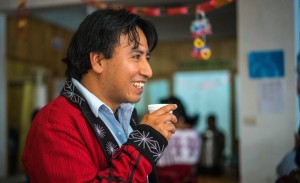 Our mission at Philanthropiece is to empower changemakers to create healthy and resilient communities. We like to believe that this mission starts with our staff. Certainly, Ernesto Perez, our Guatemala Country Director, exemplifies the qualities of a local leader who strives, through both his action and example, to generate positive social change. Recently we had an opportunity to learn a bit more from him about his community of Chajul, his motivation, and his vision for the Philanthropiece Scholars program.
Our mission at Philanthropiece is to empower changemakers to create healthy and resilient communities. We like to believe that this mission starts with our staff. Certainly, Ernesto Perez, our Guatemala Country Director, exemplifies the qualities of a local leader who strives, through both his action and example, to generate positive social change. Recently we had an opportunity to learn a bit more from him about his community of Chajul, his motivation, and his vision for the Philanthropiece Scholars program.
HAGA UN CLIC EN EL ENLACE PARA LA ENTREVISTA EN ESPANOL! Entrevista con Ernesto Perez, 2014
What are some unique aspects of your community of Chajul?
The feature that makes the municipality of Chajul unique is the identity of individuals, we are of the Maya Ixil ethnicity. The language we speak is Ixil, we have unique customs and traditions such as the temascal, our sauna-like bathing houses, as well as special clothing and food, such as boxbol. The Chajulense appreciate tourists or visitors, we enjoy sharing our Ixil culture.
How did you come to work with Philanthropiece?
Working with Philanthropiece is an opportunity to share my experience and knowledge with the younger generations, to learn about the challenges they face, and to seek solutions together. Philanthropiece believes that changes in a community should be managed by local leaders themselves and I think this encouraged me to accept the challenge of directing this program.
What do you enjoy about your work?
An important aspect of our work that I appreciate is that, as an organization, we operate with a learning model. This allows us the freedom to develop project ideas that are consistent with the vision of Philanthropiece, and prioritizes people and their development.
What is a challenge that you face in your work?
A major challenge facing the organization is facilitating the Philanthropiece Scholars in their community projects. We must see to it that we maintain effective coordination and communication, and that we put the interests of the organization before our individual interests. We make mistakes, but we work to improve peer relationships and we strive to work with respect and humility. To gain experience, and to be in service to others is my desire for our organization.
Where does your motivation for working in and for your community come from?
I have always believed that if I did my part to support people, that the environment – or nature or a higher power – would also act on my behalf. It is like a seed that is planted and in the future will provide fruit. My inspiration is to enable others to fulfill their dreams, and when they are making (positive) contributions, my goals are met.
In your opinion, what are the critical qualities that a young person in Chajul needs in order to achieve his or her personal and professional goals? How do you teach these qualities to the Philanthropiece Scholars?
One quality is discipline, which involves a physical sacrifice; in their studies, the Philanthropiece Scholars often have to sacrifice the present in order to support their future. This means making long journeys for their university courses, leaving before dawn, and many hours of study. Another necessary quality is having a vision, and that’s mental. The youth need to set goals and work to achieve them; without a clearly defined purpose, they will find that it will be difficult to achieve their objectives. A third quality is consciousness, and that has to do with the spiritual. I might have a vision and discipline, but if I have no consciousness, I might focus on things that can harm other human beings. It is important to be aware, to do things right, without causing harm. I cannot teach these qualities to the Philanthropiece Scholars in a theoretical manner. Instead, every day I strive to demonstrate these qualities with my conduct and my actions.
Is there an accomplishment in your life for which you feel particularly proud?
There is nothing that stands out. I keep a balance between the things that make me feel good: my family, the work that I have with Philanthropiece, my studies, and my community.
Who inspires you?
My parents are an inspiration to me. They taught me that achievement is gained via application, dedication and hard work. My parents are example of struggle and perseverance. They educated me about discipline and respect for others, and taught me that you can always learn from people, no matter their condition.
What makes you happy?
I believe that happiness is subjective and depends on the circumstances and the moment. I always feel something special when I share with my colleagues, my family, and my friends. Happiness for me is to share my life with others.
Photo Credit: Elena Sullivan, Philanthropiece Community Advocate in Chajul
